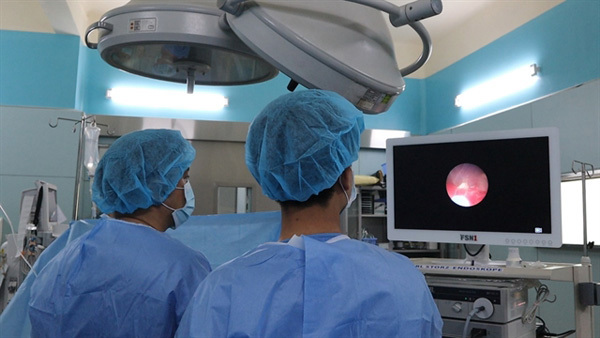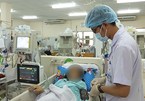 |
| Binh Dan Hospital doctors perform a percutaneous nephrolithotomy procedure to remove kidney stones. Photo courtesy of the hospital |
"Though it is the gold-standard treatment, there is a small rate of complications such as bleeding in or around the kidney, infection and even death," said Dr Vu Le Chuyen, chairman of Vietnam Urology & Nephrology Association.
According to the latest Campbell-Walsh-Wein Urology book published this year, for urologists with many years of experience, complications after percutaneous nephrolithotomy surgeries still occur. The rate of major complication could be up to 7 per cent, and 25 per cent for minor complications.
Bleeding, for instance, is a significant complication after a percutaneous nephrolithotomy procedure because kidneys contain a lot of blood.
Postoperative infections are one of the most common complications of this procedure, with 0.97 per cent to 4.7 per cent according to medical literature.
The mortality rate after the procedure is 0.05 per cent to 0.8 per cent, usually relating to infections which could not be controlled after the surgery.
Percutaneous nephrolithotomy is an advanced procedure in which a scope is inserted through a small incision in the patient’s skin to break and remove the stones.
Chuyen said that with scientific and technological advances, many hospitals were reducing open surgeries to treat large-size renal stones which could not be treated with medicine.
Patients with small-size renal stones were asked to drink a lot of water and take medicine to pass them naturally, he said.
For large kidney stones, the latest guidance on renal stone treatment of the US and European Associations of Urology recommend percutaneous nephrolithotomy to replace open surgery because it has many advantages, including less blood loss and pain after the operation and a shorter stay in hospital and smaller scars compared to open surgery.
In percutaneous nephrolithotomy, the incision in patients’ skin is nearly 1 centimetre, while patients could have a 15-centimetre incision in open surgeries, leading to injuring of kidney or surrounding organs.
Percutaneous nephrolithotomy is used to treat patients who have renal stone relapse because it helps reduce pain.
The success rate of removing stones is up 90 per cent, according to Chuyen. The rate depends on characteristics of stones, doctors’ experience, and the equipment used in the procedure.
Binh Dan Hospital has carried out more than 1,000 percutaneous nephrolithotomy surgeries on adults since 1997.
The hospital’s doctors also recently performed ultra-mini-percutaneous nephrolithotomies on three children to remove kidney stones without much bleeding or damage to tissues.
According to Dr Nguyen Phuc Cam Hoang, deputy head of the hospital, treatment of renal stones in child patients is very complex, requiring doctors to carefully consider whether to remove all the stones while ensuring the kidneys continue to function normally.
The causes in children could be congenital disorders related to metabolism and other conditions.
Hoang said eating fast food with high salt and protein content, insufficient water and lack of physical activity are thought to cause kidney stones.
Children with stones have symptoms like frequent urination, especially at night, pain in the lower abdomen, a burning sensation or pain in the urethra when urinating, and bloody or cloudy urine.
Young children with urinary stones often cry and have fever, though many show no symptoms.
Parents should give children sufficient water and many different kinds of foods and restrict salty foods, Hoang said.
According to surveys, the country’s rate of people with urinary stones is from 2 per cent to 12 per cent, including up to 40 per cent for renal stones. The country is in a region with a high rate of urinary stone incidences, called “the world stone region”. The tropical weather is a factor in increasing the incidence of urinary stones.
The incidence rate in general depends on geography, diet and hereditary factors. VNS
Gia Loc

Vietnamese girl hospitalized because of self-medicate for weight loss
Binh Dan Hospital in HCM City yesterday announced a 22-year-old girl in the southern province of Binh Duong was hospitalized because of kidney failure after using weight-loss medications by herself.

Vietnam uses robot surgery for first time on kidney cancer patient
Doctors at Binh Dan Hospital in HCM City used a robot to assist surgery in late April to remove a cancerous tumour from a 70-year-old Vietnamese woman from Tien Giang Province in the Mekong Delta.